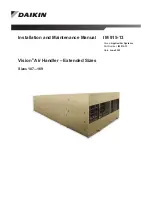
2
18-GD06D1-5
Installer’s Guide
10. Make sure there are provisions for installing con-
densate drain lines.
11. Route refrigerant & condensate drain lines away
from air handler so they do not interfere with ac-
cess panels and filters.
12. When external accessories are used, the additional
height and width requirements must be considered
in the overall space needed.
13. These units are not approved for outdoor installa-
tion.
14. These units are approved for draw-through appli-
cation only.
B. UNIT INSTALLATION
UPFLOW
a.
For maximum efficiency
, the horizontal drip
tray should be removed. Tray removal requires
that the coil be removed by sliding the coil out
on the coil channel supports. The tray is de-
tached by removing the two screws at the drain
pan and the two screws holding the two brackets
at the top of the coil.
b.
Openings where field wiring enters the
cabinet must be completely sealed.
The Re-
frigerant lines must be sealed and Electrical in-
lets need to be sealed both low and high voltage.
Location of power entry is shown on the Outline
Drawing.
c. Position unit on Pedestal or other suitable foun-
dation. If Pedestal is not used, a frame strong
enough to support the total weight must be pro-
vided. Provide a minimum height of 14 inches
for proper unrestricted airflow.
d. If a return air duct is connected to the air han-
dler, it must be the same dimensions as shown
in the outline drawing.
e. Pedestal and unit should be isolated from the
foundation using a suitable isolating material.
HORIZONTAL LEFT
a.
For maximum efficiency
and Customer ease of
filter maintenance, it is recommended that a prop-
erly sized
remote filter
and grille be installed for
horizontal applications. Airflow should not exceed
the face velocity of the filter being used.
The fac-
tory installed filter should then be removed
from the unit.
b. The unit is shipped from the factory in the horizon-
tal left airflow position.
c.
Openings where field wiring enters the cabi-
net must be completely sealed.
The Refrigerant
lines must be sealed and Electrical inlets need to be
sealed both low and high voltage. Location of pow-
er entry is shown on the Outline Drawing.
d. The unit may be suspended as long as the unit is
supported from both ends as well as the middle to
prevent sagging and service access is not obstruct-
ed.
e. If the unit is not suspended it must be isolated
carefully to prevent sound transmission. Vibration
isolators (purchased locally) must be placed under
the unit.
In addition, these air handlers are suitable for instal-
lation in an attic, garage or crawl space with ducted
supply and return air.
This equipment (for models
2/4TGB3F18, 25, 30, 36A
only)
has been evaluated in accordance with the Code
of Federal Regulations, Chapter XX, Part 3280 or the
equivalent. “SUITABLE FOR MOBILE HOME USE”
For proper installation the following items must be con-
sidered:
1. If adequate power is available and correct accord-
ing to nameplate specifications.
2. Pursuant to Florida Building Code 13-610.2.A.2.1,
this unit meets the criteria for a factory sealed air
handler.
2. Insulate all ducts, particularly if unit is located
outside of the conditioned space.
3. To ensure maximum efficiency and system
performance, the existing supply and return duct
system static pressures must not exceed the total
available static pressure of the air handler. Refer-
ence ACCA Manual D, Manual S and Manual RS
along with the air handler Product Data and Ser-
vice Facts for additional information.
4. It is recommended that the outline drawing
be studied and dimensions properly noted and
checked against selected installation site. By not-
ing in advance which knockouts are to be used,
proper clearance allowances can be made for in-
stallation and possible future service.
5. The Refrigerant lines must be sealed and Electri-
cal inlets need to be sealed at both the low and the
high voltage.
6. If supplementary heat is to be added, power supply
must be sufficient to carry the load. In addition,
minimum air flow settings, unit and duct clearanc-
es to combustible material must be maintained as
stated on the air handler rating nameplate.
▲
CAUTION
!
For air handlers not equipped with a factory installed
electric heater, a field installed heater is available from
the manufacturer. Only manufacturer-built heaters are ap-
proved for use in the air handler. These heaters have been
designed and tested in accordance with UL standards
to provide safe and reliable operation. A list of approved
heaters is provided on the air handler rating nameplate.
Heaters that are not factory approved could cause dam-
age and are not covered under equipment warranty.
7. If field installed electric heaters are applied, mini-
mum air flow settings, unit and duct clearances to
combustibles must be maintained as stated on the
air handler rating nameplate.
8. If the unit is installed without a return air duct,
applicable local codes may limit this air handler to
installation only in a single story residence & with-
in conditioned space.
9. If the outdoor unit is to be installed later, or by
others, then installation of the air handler must be
made to allow access for refrigerant lines, or attach
refrigerant lines to air handler when installing.


























